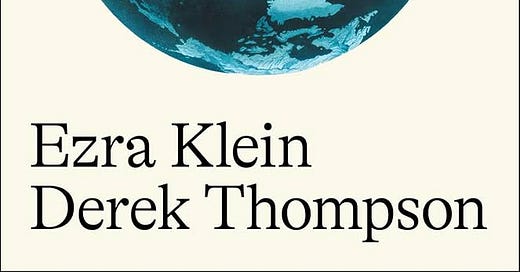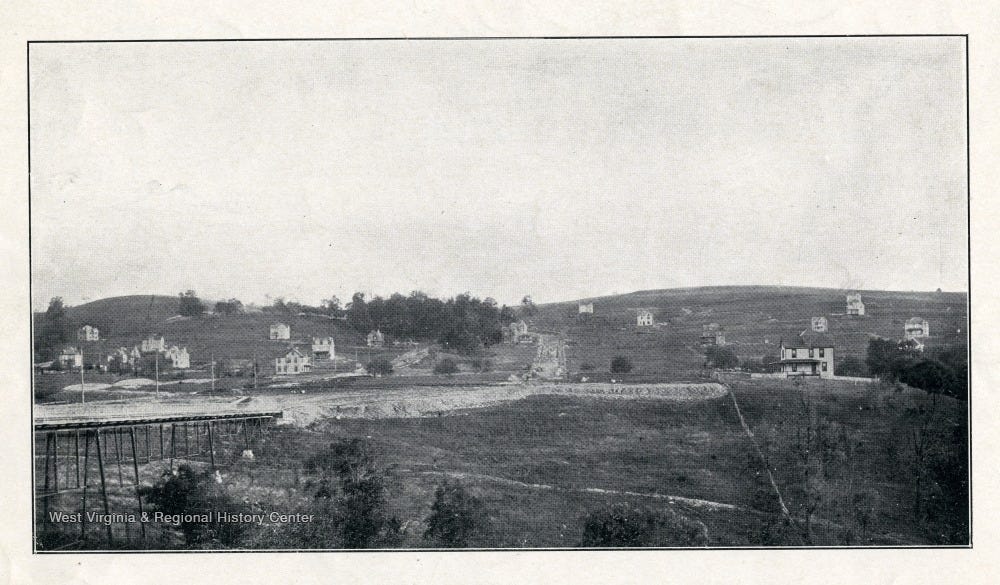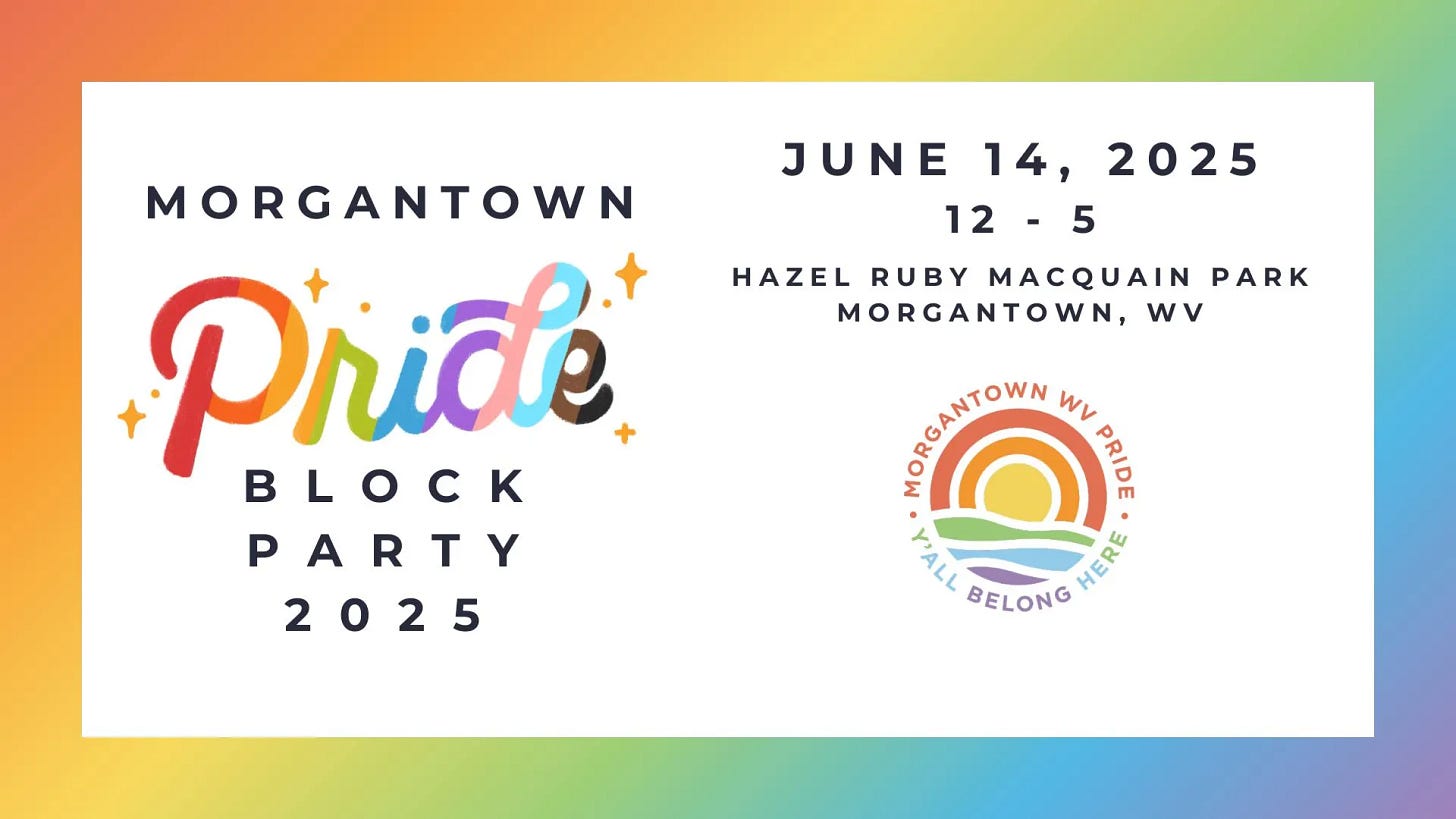Hear y’all, hear y’all!
Your seventh ward city councilor is back at the helm today to talk about housing, especially the Abundance movement. What is Abundance, and what does it have to say about housing? Let’s get into it.
On Our Minds
Abundance. What is it? Besides being the most tailored-for-the-airport airport book I have ever read, Abundance is also a “movement.” The book (by Ezra Klein and Derek Thompson) is essentially a mashup of their columns over the years, with a central thesis tying it all together: liberal cities have failed to build the things they claim to care about — housing, transit, infrastructure, climate resilience — and the culprit is, supposedly, government itself. Too much zoning, too many permits, too many veto points.
Klein meant the book as a counter to the degrowth movement, but it has serious pushback from the left more broadly, and for good reason.
So why does a book about San Francisco, New York, Chicago, and Dallas matter for Morgantown, West Virginia?
Because the movement behind it is well-funded, politically connected (Klein has briefed the Democratic caucus), and will shape the way cities, including small ones like ours, are asked to approach growth. That comes with dollars and strings attached. This issue of The Scout is a warning for city officials: Abundance, for all its packaging, has real dangers for small cities. And nowhere is that more evident than in housing.
What does the market solve for?
The central conceit and one that you will hear consistently from housing policy makers worldwide is that to solve the housing crisis, we need more housing. That’s true. It’s also expressly not. Yes, there are not enough homes for people to live in. No, simply building homes will not solve an affordability crisis.
In Abundance, Klein and Thompson bemoan the fact that affordable housing in many cities is so expensive and slow to build. They rightly identify the dozens of veto points between these projects and their completion. They also point to the massive build-up of housing stock in the Austin, Texas area as an example of how to do this right and how a sharp increase in affordable homes is a lesson in how deregulation and fast tracking can effectively solve this problem.
What is missed here is what this can mean decades onward and what it means for low-income people. Austin’s median household income is $91,000. If we follow the 30% affordability rule, that makes a rent of up to $2,275/month “affordable.” The minimum wage in Texas is $7.25/hr, which is $1,208/month before taxes. You’d need to work three full-time minimum-wage jobs just to barely afford “affordable” rent. Even at $13–$20/hr, you'd still need two full-time jobs to afford rent.
So, hooray — the market "solved" this problem… for people making upper-middle incomes or working two to three jobs.

The point is that the market cannot solve for things that humans need to live. You cannot solve homelessness with shelters. You solve it by keeping people in homes—permanently. It’s cheaper. It works. And it avoids compounding the trauma of co-occurring crises like mental health issues and substance use.
The truth is the market doesn't care about your basic needs. It solves for profit. When we turn housing — a fundamental human right — into an investment tool, we get ever-rising rents, ever-growing inequality, and a system rigged against the poor.
Morgantown knows this firsthand. Our public housing is scarce and closed to new applicants. The waitlist is two years long. Meanwhile, we’re being sold “workforce housing” for the “missing middle,” which somehow keeps missing the poor.
If we invested in deeply affordable housing, we’d help not only the poorest residents but also middle-income renters who are being squeezed out. That’s how housing markets loosen.
The imagined mic drop moment in Abundance when it comes to housing was when the book detailed a housing project in California that cost two and at times three times as much to build because of air filtration requirements in the project, since it was going to be built beside a highway. The authors posit, “Isn’t it better to house people in a smoggy apartment than leave them under a bridge?”
I reject that binary choice. In the richest country in the world, with vast amounts of unused land and empty homes littering the country, it is not simply “build a cancerous apartment or none at all.” Why was that the only site available? Why not challenge the system that forces poor people to live in toxic places to begin with?
There is zero analysis of redlining, corporate obstruction, or gentrification, all central to why housing is unaffordable. The book’s diagnosis is “too much government,” not “too much capitalism.” That’s telling.
While it is absolutely true that the veto points in these types of projects — outdated zoning code and deference to interest groups — is a serious problem government needs to be grappling with, it should not be in service of continually feeding a market that is hostile to the goals that we are setting out. The market does not want equity in our communities, it does not want permanent affordability, it does not want safer housing, it does not want stronger communities, it wants profit.
If we believe that housing is a human right, we need to treat it as such: not by throwing poor people into smog-filled apartments and telling them this is the best we can do, but by actually prioritizing social housing as the place we want people to be living. Rather than scrapping how we build these projects with our communities’ feedback entirely, we should be thinking about how we are avoiding consensus-building in these projects and removing everyday people’s barriers to entry in affecting their community. People are not disillusioned with the government because they think the government is incapable doing good things; they are disillusioned because they know it can and it regularly locks them out of being able to effectuate that change, or worse, doesn’t care what they have to say about it.
In closing, yes, remove minimum parking requirements, reform and update zoning codes, fast track low-income housing projects, and focus on outcome measures when designing projects. What we cannot do is think that anything less than a monumental effort is going to create an effect on housing affordability and homelessness in Morgantown. We will not simply build our way out of this. We need significant investment in real public housing that meets the needs of our community to the tune of tens of millions of dollars every year. We need officials and community leaders who are not afraid of consensus-building and developing buy-in for transforming our community. Countries that have solved homelessness have done so because more than half of their housing stock is either permanently affordable or subsidized.
What it takes from us is the will as a community to step out on that ledge and jump, to make it happen and accept no excuses when it doesn’t.
In Our Community
On the rail trail near the Marriott there will be “Life Below The Waterline: A Freshwater Mobile Aquarium Experience” — hosted by Orsanco & Fore June 10 – June 12. A mobile aquarium sounds so adorable.
Hinder will be at the Ruby Amphitheater for the free summer concert series on June 13th if the kiss of an angel music is the sort of thing you are in to.
At that very same amphitheater, yours truly will be helping to host the 6th annual Morgantown Pride block party from 12 - 5pm. We have over 50 vendors and a slew of insanely talented performers, as well as food trucks and just a beautiful queer community for you to come celebrate so I hope to see you there!
June 14th will also have the annual First Ward yard sale as well as a No Kings protest in conjunction with the national protests happening against Donald Trump on his birthday.
Manifold
While I have been steeped in a great deal of media as of late as a sort of coping mechanism for the absolute insanity that society is these days, I will try to pluck out a few of the big stand outs for me lately.
Clair Obscur: Expedition 33 is one hell of a video game. It seeks to reinvigorate one of gaming’s most time-honored genres, the turn-based RPG, with some mechanical flair that is probably a bit too nerdy to get into for this readership. However, where it has impressed me is in its storytelling. You find yourself in a post-apocalyptic environment where every citizen is destined to die at a prescribed age. At this time, everyone in this city will die at age 33, and an enormous pillar far in the distance illuminates the number 33 ominously as a constant reminder to the citizens that their death is near. Explorers volunteer to leave the city in their final year of life to try to find out how to stop this from happening. This sets up your adventure. The opening moments of the game had a great deal to say about what we do with our time on this earth, whether it is right to sacrifice our well-being and that of our loved ones to create a better world for those who come after us, what it means to fight against futility, and what it takes from us in the process. The game is a generational triumph that transcends the medium.
Casually walking past my Nigerian co-worker a month or so ago, I heard some sounds that intrigued me and asked what was playing in his ear pods. He showed me his phone and said “Oh it’s this, it’s Nigerian you won’t like it.” So naturally I immediately queued the album up. The album was Viva Lavida by Joeboy. I have been entranced by the album and have come back to it several times already. This being my first ever foray into Nigerian music I cannot speak to its unique character but it sounds infinitely interesting to me with elements of dance hall, afro beat, trap, lo-fi hip hop and so much else going on it is indisputably a VIBE. This is a good one to write a community newsletter to.
That’s all for this week, folks. I highly recommend taking a seven year old to the Morgantown Public Library for his first library card to lift your spirits.
Solidarity,
Brian










